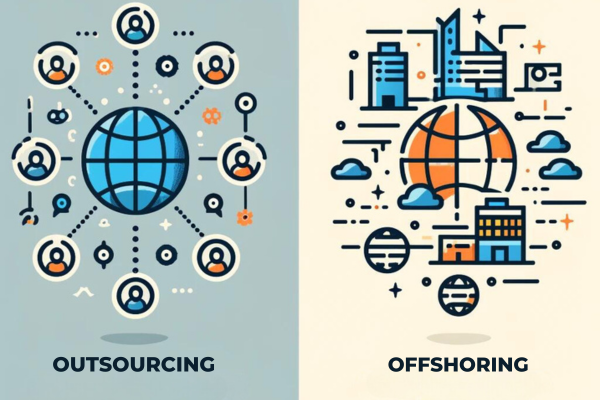News & Events
April 5, 2024

Today’s globalized economy, businesses often seek ways to optimize and be efficient. They want to maximize their operations. Two common strategies employed by companies are outsourcing and offshoring. These terms are sometimes used interchangeably. But, they represent distinct approaches with unique benefits and considerations. In this article, we’ll cover the differences between outsourcing and offshoring. We’ll also explore the benefits they offer to businesses.

Outsourcing means contracting out business functions to external third parties. They can include customer solution, contact support and back office services. They can also include manufacturing and accounting. Outsourcing allows businesses to delegate tasks to specialized vendors. They use the vendors’ expertise and resources to streamline operations.
One main reason companies outsource is to focus on their strengths. They delegate non-core tasks to outside specialists. This lets businesses allocate their resources better. It also cuts costs and boosts productivity. You may reach a larger skill pool via outsourcing as well. Access to specialist expertise that might not be available inside is another benefit.

Offshoring is different. It means moving business processes or services to a foreign country. Usually, this is to use cheaper labor, better regulations, or specific expertise. Outsourcing can involve domestic or international providers. But, offshoring specifically entails moving operations overseas.
Businesses often choose offshoring. It lets them save money by using cheaper labor abroad. By moving operations offshore, companies can cut labor costs. They can do this without hurting quality or efficiency. Offshoring also lets organizations expand globally. They can tap new markets, driving growth and competitiveness.

Outsourcing and offshoring both aim to improve efficiency and cut costs. But, there are key differences between them:
Outsourcing offers several benefits to businesses of all sizes across various industries:
Offshoring poses unique challenges. But, it also offers big advantages for businesses that want to expand globally.
In conclusion, outsourcing and offshoring are strategic approaches. Businesses can use them to boost efficiency and cut costs. This gives them advantages in today’s global market. Both approaches offer benefits. So, businesses should review their objectives, resources, and risk tolerance. Then, they can choose the best strategy. Businesses may make well-informed judgments if they are aware of the distinctions between outsourcing and offshore. These decisions should align with their long-term goals and objectives.
Looking for a reliable partner to support your outsourcing needs? Look no further than TMJP BPO Services. TMJP BPO Services has a proven track record of delivering great results. They specialize in providing complete outsourcing solutions.
Our team is experienced. They are dedicated to operational excellence. They help our clients achieve their goals. You may need to streamline customer support, or improve back-office processes. TMJP BPO Services has the skills and tools to help.
At TMJP BPO Services, we understand that every business is unique, which is why we take a personalized approach to every client engagement. We offer scalable and adaptable solutions that maximize value while meeting your changing demands.
Partnering with TMJP BPO Services means gaining a trusted ally committed to your success. Let us handle the day-to-day operational tasks so you can focus on what matters most—growing your business and serving your customers better.
Ready to take your business to the next level? Get in touch with TMJP BPO Services right now to find out more about how we can support your objectives and promote long-term growth.
